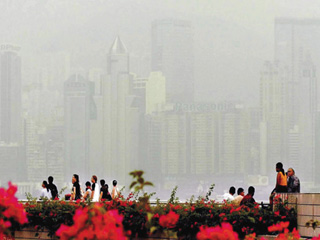
A local green group Monday presented a report to the administration challenging its claim about Hong Kong's safe air quality.
Having measured the territory's air quality in the past nine days, Greenpeace said the government's figures were misleading, and their studies indicate that pollution in some districts was up to three times the level accepted in other cities.
"The government has set the acceptable pollution levels, or the Air Quality Objective (AQO) much too high," assistant campaigner of Greenpeace Edward Chan told reporters after handing the report to government officials.
This means that the government's official readings give the false impression that pollution levels are lower, while Greenpeace confirmed that Hong Kong's air quality has exceeded international safety levels by 200 per cent over the past week.
Citing October 27 as an example, Chan said monitoring stations in all districts showed that breathable particles were double to triple the safety levels of the European Union, but the Air Pollution Index (API) were all under 100 and no health warning was issued to the public.
"With the current loose and outdated AQO in Hong Kong, the public receive no warnings from the government to stay indoors."
Greenpeace's report also found that rural areas, including Tung Chung and Yuen Long, had unexpectedly high pollution levels, and sulphur dioxide levels in the northwest New Territories were even higher than city areas like Central and Causeway Bay.
To emphasize their message, Greenpeace volunteers wearing gas masks handed the report marked "failed" to environmental officials.
They urged the Environmental Protection Department to play a more active role in identifying, investigating and taking action against the parties responsible for poor air quality.
"The government should immediately review and adopt a stricter AQO, redefining the API so that it serves as a real air quality reference that the public can rely on.
"We demand that the administration implement tighter regulations to control the major causes of bad air quality including the reduction of gas emissions from our coal burning power plants," said Chan.
Hong Kong's worsening pollution has been a focus of public concern in recent months as members of local green groups blamed drifting smog from the Pearl River Delta as a major source of the city's pollution.
But Greenpeace said most pollutants in the territory are produced by Hong Kong's own coal plants and power stations.
(China Daily HK Edition November 2, 2004)
|

